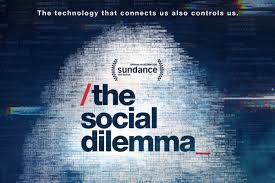 The Social Dilemma (2020)
The Social Dilemma (2020)
Director Jeff Orlowski's new Netflix Documentary repudiates the wishful thinking that technology is a neutral tool, and that what matters is how we use it. Yes, technology has benefited the entire world in numerous ways. But there's also a consensus now among some of our elite technologists, many of whom are featured in this film, that there's a dark side to the digital world in general, and in particular to the behemoths like Google, Amazon, Facebook, and Apple. Big Data is now the new oil, which is why some people call it an "extraction" industry. Big Data is so big that it's hard to comprehend. Back in 2016, Propublica collected more than 52,000 unique attributes that Facebook has used to classify individual users. But the real force multiplier is metadata, or the "data about the data," like where you were when you bought ice cream on Tuesday, what flavor you bought, how many times you have been to that store, what model of car you were driving, who was in the car with you, the precise time of day, every single post you've made on Facebook, what time you go to bed and wake up, etc. Metadata has unimaginable value because of its nearly incomprehensible scale, and its ability to create powerful algorithms to manipulate our behavior. Metadata gave rise to the aphorism that "users are not the customer, they are the product." Thanks to the algorithms that are based upon metadata, it is a tool of incredible behavioral prediction and manipulation. Artificial intelligence that uses such metadata has what Roger McNamee calls "nearly perfect information about us." So, critics are also warning us of mass behavioral addiction. The average user spends about three hours a day looking at their smart phone screen. Only 12% spend less than an hour. In one study by the research firm Dscout, the average number of touches, taps, swipes, and clicks was 2,617 per person per day. This mass behavioral addiction is not an accident. Nor is it a character flaw in the user. Rather, it is the result of carefully engineered designs by the technology companies. Indeed, it is their very business model. The science of engineering compulsion is called "persuasive technology," which is the title of the gold standard book on this subject by the Stanford professor B.J. Fogg. You can take a course on it at many universities. Persuasive technology is a complex combination of software architecture, applied psychology, behavioral economics, propaganda, variable reward, and techniques that are used to program slot machines. The goal is not mere "engagement" with an app or a site, it is addiction. Tristan Harris, a former Google design ethicist who narrates much of this film, and who took Fogg's course at Stanford, calls it "brain hacking." Similarly, says McNamee, with persuasive technologies, "Artificial Intelligence has a high bandwidth connection directly into the cerebral cortex of more than two billion humans who have no idea what they are up against." But if you watch this film, you can in fact know the long odds that we face to reclaim our personal, social, and political freedom.
For more on this important subject, see my two recent essays: January 5, 2020: "Techtopia Now" (Part 1): https://www.journeywithjesus.net/theeighthday/2498-techtopia-now-part-1, and February 2, 2020: "Techtopia Now" (Part 2): https://www.journeywithjesus.net/theeighthday/2516-techtopia-now-part-2.
I watched this film on Netflix streaming.
Dan Clendenin: dan@journeywithjesus.net


